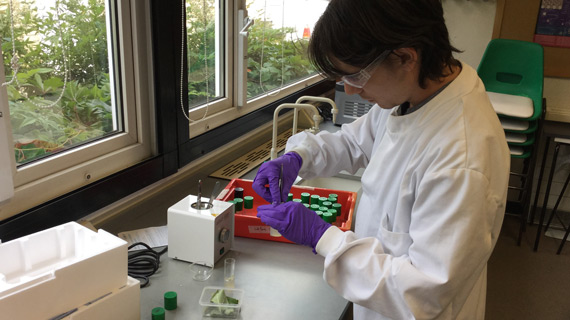
Student Internships in Life Sciences
We offer a range of paid internships to our students, giving them the chance to gain valuable work experience, and collaborate with us on important research projects.
Bioscience
| | |
|---|
Stephanie Martin
Stephanie completed an internship with us looking at the genetic classification of tarantulas. Her work contributed to conservation efforts in this area, as zoos and other conservation projects very often classify these spiders on appearance alone.
|
PROFILE  |
Dustan Nicol-Wilson
Dunstan helped us to trouble-shoot and streamline our molecular biology experiments for new undergraduate students. This involved a careful and detailed examination of the step-by-step processes for each experiment, and using his findings to suggest improvements to improve the quality of our lab teaching.
|
PROFILE  |
Plant Science
| | |
|---|
Nick Rowe
Nick looked at the 'Micropropagation of apple cultivars from dormant and growing plant tissue'. This project demonstrated a new approach to propagating seedlings that has potential commercial applications.
|
PROFILE  |
Rebecca Blenkinsop
Rebecca completed a ten week paid internship in Plant Science, learning how to control the levels of nitrate in beetroot juice, so that this could later be used by Sports Science for an investigation into the effects of nitrate in athletic performance.
|
PROFILE  |
Animal Science
| | |
|---|
Konstantinos Tsiolis
Konstantinos has just completed his second year and is carrying out research into the use of biological pest control. Working with Senior Lecturers Chris Harvey and Joseph Burman he is investigating the effects of stopping pesticide use on a pear orchard in Rochester. Through monitoring the changes in insect populations it is hoped that a way to use natural predators can be found to manage the pests posing a threat to the crops, saving the farmer up to £10,000 a year.
|
PROFILE  |
Environmental Science
| | |
|---|
Joe Ford
Joe investigated the nutrient retention properties of various forms of soil and compost. From his research, Joe was able to judge which samples were better at holding nutrients, and therefore better for plants.
|
PROFILE  |
Ecology and Conservation
| | |
|---|
Lailing Lee
Lailing completed her internship looking at the genetic diversity of midges breeding in the Great Stour River, Canterbury. Her work has contributed towards the development of a tool for the identification of midges using DNA barcoding, and the hope is that Lailing's work will be used to contribute to a research paper which is to be published in a scientific journal.
|
PROFILE  |